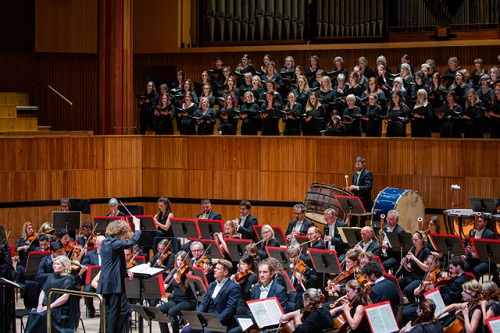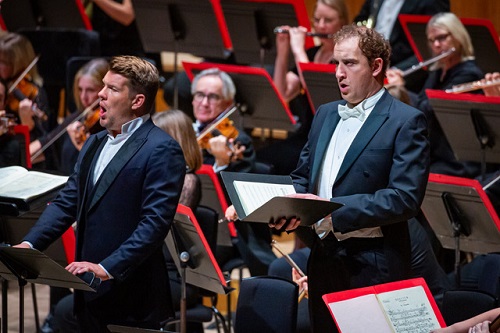The Philharmonia Orchestra is no stranger to offering Verdi’s Requiem as either a work to open a season – or to close it (or anywhere in between). Many of its most celebrated performances were given by Carlo Maria Giulini (and it would also be the work which Guido Cantelli conducted his final concert with this orchestra). All one really asks is that the performance be something memorable; alas, this was not the case with Santtu-Matias Rouvali’s which fell well short on that front.
He’s not the only conductor I have heard struggle with this Requiem in recent years. Indeed, I have begun to wonder if Verdi is the new Wagner – whether a shortage of great Verdi singers is just as industrial in scale as that of great Wagner ones. I have also wondered recently whether Italian conductors simply do this work better than non-Italian ones. My shelves seem to creak with the latter: Giulini, de Sabata, Serafin, Toscanini, Cantelli, Abbado, Muti and Sinopoli to name just a few. Odd combinations can sometimes work sublimely – like the cerebral, but passionate, Sinopoli and the massive sonorities of the Staatskapelle Dresden; or, the only time Riccardo Muti ever conducted the LSO, at the Brighton Festival in June 1973, in a performance of high-risk drama that barely conceals the collisions of conductor and orchestra. Claudio Abbado’s LSO performance from the 1982 Edinburgh Festival, with Jessye Norman singing the mezzo part (and Margaret Price, José Carreras and Ruggiero Raimondo the remaining soloists) constantly floors me. Not for the first time after a performance of Verdi’s Requiem, I asked myself if we are past the Golden Age of great performances and back in a Bronze Age.
This work can, I think, be approached two ways – either as sacred devotion, or in a more operatic way. As Hans von Bülow wrote, the Requiem is “Verdi’s latest opera, though in ecclesiastical costume”. Rouvali seemed to take neither approach – or neither consistently, or with much conviction if he was interested in taking one or the other to begin with. Nor – and this is unsurprising given Rouvali’s tendency towards manipulating tempo – did this Requiem have a sense of infinity in its line; in movements the work might be, but they are rarely broken ones. The Dies irae, in particular, lacked a single, architectural span. My impression of this performance was that if this Requiem had been a church it wasn’t one that had been completed; on the other hand, it might well have been one from the Reformation being torn down. Another view might be that this is simply not Rouvali’s work at all.

In common with many conductors today – and Victor de Sabata – Rouvali took the opening Introit and Kyrie with a great deal of measure to it. It’s not that the risk of slowness never works (try Gundula Janowitz in ‘Frühling’ from Richard Strauss’s Vier letze Lieder, for example) rather it’s the need to establish this music’s sense of conclusion almost from the beginning. As low and muted as the first bars can sound they should be just as arresting, just as gripping, as those of, say, Brahms’s Symphony No.1. On the other hand, the appearance of the Day of Judgement was thrilling – and each time the motif reappeared it was equally so, almost cut-and-paste in its precision. The Tuba mirum was too dense for my taste; the Ingemisco lacking serenity. Perhaps Rouvali found himself more comfortable with the orchestra alone – the blazing trumpets of the Sanctus, the drama and weight he brought to the timpani and descending strings in the Dies irae or the threatening drumrolls from the Lux aeterna. There was some semblance of a visionary radiance from the orchestra’s woodwind as a balance against its colossal terror, but they weren’t highlighted often enough.
The problems with this performance really began and ended with its soloists – particularly the soprano and the tenor. Things did not begin well for the tenor, Stanislas de Barbeyrac, who broke short on his first line; worse was to come in the Ingemisco. His voice is short on volume and he sometimes struggled to both be heard above – let alone around – the orchestra and his fellow soloists. There is, however, an undeniable colour, even a certain voluptuous tone, to de Barbeyrac’s voice but whatever natural beauty exists at the bottom of the range (which he controls with ease) is offset by enormous pressure at the top. Having read in the booklet notes that he is to sing Siegmund in Die Walküre with the Rotterdam Philharmonic I found the idea bewildering on the basis of this performance.
De Barbeyrac at least sang to the audience (and was the only one to use an iPad) which was a significant improvement on the soprano, Susanne Bernhard. The great choral works like Verdi’s Requiem or Brahms’s Ein Deutsches Requiem don’t necessarily need the soloists to memorise their parts but nor is the ideal to give the impression they are reading from a book either. Bernhard (a replacement for the planned soprano, but not nearly so late a replacement as the bass, Tareq Nazmi) seemed disengaged from this performance simply because she was too often buried deep within the score. It is certainly easy to hear from this soprano why she sings Leonora from Beethoven’s Fidelio – by no stretch of the imagination is the voice a small one, or in the least rich and solid at the bottom of the register; there is even a velvety alto lushness which many sopranos lack. At times, she might have sounded a little too close to the mezzo, Karen Cargill – initially in the Introit and Kyrie where the mournfulness of the music is first established, but more crucially in the Recordare where the two voices are more in parallel with one another. Were it not for the fact that Bernhard seemed so distant in the Libera me, the performance of it would, I think, almost have been an extremely fine one – bar the fact her top C at the end was underwhelming (as it had also been in the closing quartet of the Salva me).

More balanced were the mezzo, Karen Cargill, and the bass, Tareq Nazmi. Everything I have heard from Cargill over the past few years has been superlative and this was no exception. She carried the Liber scriptus not simply because the voice has such a gorgeous tone, a seductiveness that draws you into it, but because she is so aware of the nuances in the orchestra that allow her to frame the text in such a marvellously vivid narrative. If the criticism one had of Susanne Bernhard was that she was too literal, too beholden to reading what was in front of her, then Cargill brought out the dramatic, and the Verdian colour which runs through this work. Of all the soloists it was Karen Cargill who most matched the Philharmonia’s own sound – her burnished, glowing register was often precisely in harmony with the golden horns, or the darker bassoon. In the Recordare one was drawn away from the soprano and towards the mezzo simply because of the differing quality in the singing; you slightly felt listening to it as if left and right channels on speakers weren’t quite balanced correctly.
Tareq Nazmi, too, was often superb. His Confutatis, often one of the more problematic sections of the Requiem, was exquisitely done. If the problem with the tenor had been a voice which was often short of volume, then Nazmi was the opposite. His power was enormous – when he sang of damnation one felt the terror and fear of it in the voice. Like Cargill, he synchronised his voice to the tone of the orchestra; the darkness of his bass was often a shadow to instruments alongside the text. It was one of the more vivid performances I have heard of the bass part for quite some time.
The Philharmonia Chorus were largely on magnificent form. It wasn’t the clearest reading of the text I have heard, but this was more than made up for by the impact they made in singing it. They were weighty in the Confutatis; and the enormity of their entry in the Libera me was monumental. I think one tended to be drawn more towards the Philharmonia Chorus men rather than the women – although this is probably to do with Verdi rather than the quality of the singing itself which favoured one over the other.
Despite Santtu-Matias Rouvali’s lack of a vision in this work and largely uninspired conducting the Philharmonia played superbly – even if the sparks of electricity the Verdi Requiem needs ought to have been ratcheted up several gears from the one or two moments there were. But it was rather more than this as well . Giulini may well have become more monumental, even marmoreal, when he conducted the Requiem in his later years, but the one thing that always remained constant about his performances was the sense we had been on a spiritual, meaningful and dramatic journey with the conductor. And there was always a sense of occasion to a Giulini performance. Rouvali’s was lacking in both. Not the most memorable of evenings, I’m afraid.
Marc Bridle
Giuseppe Verdi, Messe de Requiem
Susanne Bernhard (soprano), Karen Cargill (mezzo-soprano), Stanislas de Barbeyrac (tenor), Tareq Nazmi (bass), Philharmonia Chorus (Gavin Carr, chorus master), Santtu-Matias Rouvali (conductor), Philharmonia Orchestra
Royal Festival Hall, London; 21st September 2023.